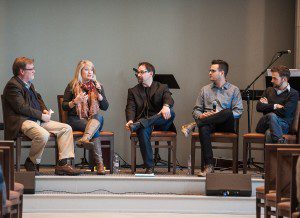 Belmont University’s College of Theology and Christian Ministry is hosting the second annual Faith and Culture Symposium this week with various speakers concentrating on the idea, “Worship and the Life of the University,” including keynote speaker Enuma Okoro. All events are free and open to the public to attend.
Belmont University’s College of Theology and Christian Ministry is hosting the second annual Faith and Culture Symposium this week with various speakers concentrating on the idea, “Worship and the Life of the University,” including keynote speaker Enuma Okoro. All events are free and open to the public to attend.
Associate Professor of Theology Dr. Steve Guthrie said, “This year’s event was inspired by the new chapel space that opened on Belmont’s campus in the Wedgewood Academic Center. Christian worship, of course, is an activity undertaken by Christian communities. Having a chapel on campus, however, encourages us to think about the relationship between worship and the wider culture in which Christian communities are located.”
A roundtable discussion kicked off the symposium on Monday with a conversation among local ministers of worship and music from four different Nashville churches: Ethos Church, Forest Hills Baptist Church, St. Bartholomew’s Episcopal Church and Woodmont Christian Church.
Okoro will offer the keynote address Thursday, Feb. 26 at 7 p.m. in the Chapel focusing on her reflection of worship as a writer and poet. A Nigerian-American journalist, speaker and certified spiritual director in the Ignatian tradition, Okoro is the author of four award-winning non-fiction books, and her work has been featured on ABC’s “Good Morning America” CNN and NPR as well as in the New York Times and Washington Post, among others.
In addition, Yale Divinity School and the Yale Institute of Sacred Music’s Assistant Professor of Liturgical Studies, Dr. Melanie Ross, will present “What we Get Wrong About Worship” on Wednesday, Feb. 25. Executive Director of the Society for Continental Philosophy and Theology Dr. Bruce Ellis Benson will also speak from his latest book, Liturgy as a Way of Life, on Friday, Feb. 27 in the Leu Center for the Visual Arts.
Guthrie also mentioned that the events will focus on the questions such as, “What relationships exist between the worshipping life of a Christian community and the larger culture in which it is situated? What is the relationship between worship and the different sorts of disciplines and studies that are pursued at a university like Belmont? What are some of the different ways that worship intersects with art, culture, commerce and politics?”
For more information, click here.


